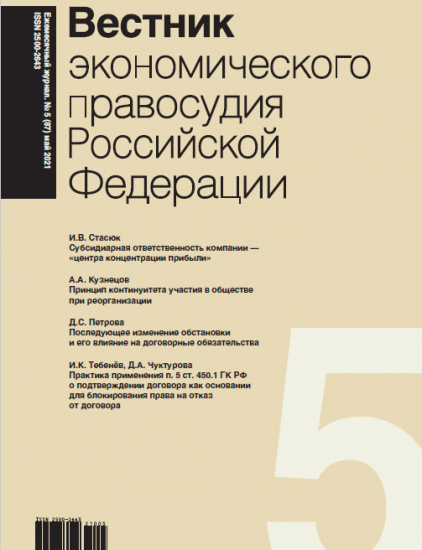 Press to zoom
Press to zoom
ARCHIVE FOR 2021 RUSSIAN
mag->month > 0 ) { ?>
mag->getMonthString();?> mag->year;?>
mag->pdf_file): ?>
sess && $this->sess->isArticlePayed()):?>
Май 2021
CONTENT
Ivan Stasyuk Subsidiary Liability of a ‘Profit Concentration Centre’ Company Case Comment on the Judgment of the Chamber for Economic Disputes
of the RF SC No. 310-ЭС20-6760, 25 September 2020
The author examines the Supreme Court’s ruling in the UGMK Rudgormash case and concludes that the status
of a controlling person is not a prerequisite for subsidiary liability. If a person has led a debtor to bankruptcy
through his wrongful actions, he will be liable for the debtor’s debts even if he does not have control over the
debtor.
Keywords:
subsidiary liability, controlling person, beneficiary
Buy a PDF
Sergey Budylin Rubbish Advertising and a Fickle Tenant. Does the Contract Terminate When You Unilaterally Withdraw from It? Comment on the Case White and Carter (Councils) Ltd v. McGregor [1961] UKHL 5 and on the Judgment
of the Chamber for Economic Disputes of the RF SC No. 305-ЭС20-4196, 26 June 2020 57
The article discusses the positions of the highest courts in England and Russia on the possibility of terminating
a contract by unilateral expression of will. As a general rule, a party to a contract does not have such right: termination of contractual obligations, as well as their creation, requires the consent of the parties. If the
contract remains in force, the other party can still enforce it and collect its losses as they arise. However,
in some situations — for example, where the contract requires the active participation of both contracting
parties — the courts will recognise the contract as terminated in its essential part immediately after a party
expresses its categorical refusal to perform. The other party may then recover its damages for breach of
contract, calculated on the basis of the mitigation requirement.
Keywords:
lease, termination of a contract, damages, England, Russia
Buy a PDF
FREE TRIBUNE
Alexander Kuznetsov Principle of Сontinuity of Participation in Reorganisation The article reveals the meaning and basis of the principle of continuity of participation in the company during
reorganisation, which implies that a participant (shareholder) of the reorganised company acquires the status of
a participant (shareholder) in the company created by the reorganisation or in the company to which the merger
occurs, depending on the type of reorganisation. The study concludes that the principle of continuity is one of
the main guarantees of the rights of the participant (shareholder) protecting him/her from exclusion from the
participants (shareholders) in the course of reorganisation. At the same time, the possibility of derogating from
this principle in respect of minority shareholders of PJSC, should be recognised when this is provided for in the
conditions of reorganisation, approved by the owner of the super-majority block of shares, and such minority
shareholders will be paid the market value of their shares.
Keywords:
participation continuity, reorganisation, protection of participants’ rights, exclusion of participants (shareholders)
Buy a PDF
Daria Petrova Subsequent Change of Circumstances and Its Influence to Contractual Obligations in the Russian Law: Political and Legal Perspective and Relevant Issues of the Jurisprudence of Courts The article provides complex legal analysis of the clausula rebus sic stantibus under the Russian law. The author
looks at political and legal perspectives of the doctrine of subsequent fundamental change of situation, as well
as analyses the provisions of the actual Civil Code defining cases of change of circumstances occurred after
the formation of contract and its consequences. The article explores legally relevant features of circumstances
which lead to termination (alteration) of a contract due to significant change of circumstances, its content under
the Russian doctrine and relevant jurisprudence of courts. In particular, it considers the problem of correlation
between entrepreneurial risk and risk of significant change of circumstances as well as the contents of the
criteria of irresistibility of significant change of circumstances. The author analyses also the consequences of
significant change of circumstances in Russian law.
Keywords:
contract, obligation, significant change of circumstances, termination of a contract, alteration of a contract
Buy a PDF
Mikhail Zhuzhzhalov Article 66.1 of the Civil Code: Is It Just Numerous Flaws or One Big Mistake? Since the introduction of Article 66.1 of the Civil Code, which strictly limited the list of ‘contributory’ property,
equally for all corporations and regardless of industry, it has attracted no more attention than before its adoption.
This is because the usual contributions to property remain money and things. Nevertheless, even the rare cases
in which the article has been applied by the courts show that the regulation is very controversial, both in terms
of drafting and because it originally went with other legislative proposals which did not pass muster. In addition,
in the author’s view, it is based on a completely false understanding of share capital. This renders the regulation meaningless, but in any case a serious revision of the content of the analysed article is required. The author also
raises the question of the constitutionality of the provision.
Keywords:
share capital, contribution to property, object of civil rights, corporate law
Buy a PDF
